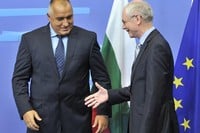SOFIA, Bulgaria—Bulgaria, the European Union's poorest member state and a rare fiscal bright spot for the bloc, has indefinitely frozen long-held plans to adopt the single currency, marking the latest fiscally prudent country to cool its enthusiasm for the embattled currency.
Speaking in interviews in Sofia, Prime Minister Boyko Borisov and Finance Minister Simeon Djankov said that the decision to shelve plans to join the currency area, a longtime strategic aim of successive governments in the former communist state, came in response to deteriorating economic conditions and rising uncertainty over the prospects of the bloc, alongside a decisive shift of public opinion in Bulgaria, which is entering its third year of an austerity program.
"The momentum has shifted in our thinking and among the public…Right now, I don't see any benefits of entering the euro zone, only costs," Mr. Djankov said. "The public rightly wants to know who would we have to bailout when we join? It's too risky for us and it's also not certain what the rules are and what are they likely to be in one year or two," Mr. Djankov said.
Bulgaria's move to freeze accession plans comes as Europe's debt crisis has caused other fiscally prudent European nations to back away from adopting the currency. Lithuania's Prime Minister Andrius Kubilius last week said that his country would only join the common currency when "Europe was ready," signaling that his government had tempered its previous enthusiasm. That followed a statement from Latvian Prime Minister Valdis Dombrovskis that his government would decide on a euro-adoption timetable in the spring of 2013, contrasting with a previous pledge to join in 2014.
Bulgaria has won plaudits for successfully reducing its budget deficit to 2.1% of gross domestic product in 2011 by slashing wages and pensions. The economy is stabilized by a currency board that pegs the currency, the lev, to the euro and forces the government to hew to tight policy.
After three years of fiscal rigor, Sofia now satisfies all criteria to enter the European exchange-rate mechanism, the final stage before adopting the euro.
But Prime Minister Boyko Borisov said concerns had been heightened by growing disputes between policy makers, some of whom back Germany's call to give priority to fiscal discipline over growth, while others want a more expansionary policy.
"I'm certain that we will definitely see a deepening divide in Europe now because many governments are not prepared to stomach the difficult decisions they have to take. It's like a spoilt child who doesn't want to go to the dentist to fix his bad teeth, even though the operation is needed," Mr. Borisov said. "This moment is critical for the euro zone and for the EU," he added.
Mr. Djankov said that Bulgaria's economy should still expand by around 1.5% this year, but warned that the euro zone could face up to five years with "zero growth" if national leaders continue to mull policy responses to the crisis instead of fully backing Germany's call to continue strict fiscal consolidation.
On the periphery of the euro zone, but overwhelmingly dependent on the bloc's larger economies for growth, Bulgaria has thus far managed to weather the euro crisis. The economy last year grew by a modest 1.7% and the European Bank for Reconstruction and Development expects that to slow to 1.2% this year. Unemployment has risen to over 12%, but that is around half the levels in Greece and Spain, while Russian investment in the Black Sea resorts is rising rapidly.
In July, when investor sentiment toward the euro zone was less negative, Sofia tapped capital markets, with a heavily oversubscribed five-year €950 million 1.19 billion) Eurobond.
But Bulgaria's exposure to the deteriorating health of the euro zone has been compounded in recent months by mounting problems of other economies on its borders.
Neighboring Romania has been plunged into political crisis as the government has repeatedly sought to impeach President Traian Basescu on charges of graft. Serbia and Macedonia are reliant on international bailout funding, while Turkey's economy, which expanded 9% last year, has slowed sharply, abruptly curtailing a bilateral trade boom.
"Bulgaria should successfully balance its budget this year but everywhere else we look there's economic problems. That still affects us no matter how much hard work we do," Mr. Djankov said.
The combined effect means Bulgaria's ruling party, which appeared to defy political gravity by maintaining popularity amid spending cuts, is facing growing pressure.
Opinion polls show that Mr. Borisov's GERB party remains the most popular party, but public support has declined significantly in recent months after austerity measures and a lack of significant results in fighting crime and graft. Analysts say that will make it very difficult for Mr. Borisov to form a single-party government at national elections due next year.
The ruling party has already survived four parliamentary no-confidence votes since it took power in 2009, with opposition lawmakers failing to topple Mr. Borisov over charges that he failed to reform the inefficient judiciary and combat organized crime and corruption that has stirred concern in Brussels.
This story was released by the Wall Street Journal on Sept 3rd 2012. For morte on this story please visit http://online.wsj.com/article/SB10000872396390443759504577629323056333022.html?mod=WSJEurope_hpp_MIDDLETopStories
- aheloy
- apartment
- bansko
- beach
- black sea
- black sea coast
- bulgaria
- bulgaria. sale
- for sale
- nessebar
- pamporovo
- pomorie
- property
- property for sale in bulgaria
- property for sale in sunny beach bulgaria
- sea
- sell
- sell property
- sell property in bulgaria
- selling
- selling property in bulgaria
- selling property in sunny beach
- ski
- sofia
- sozopol
- st.vlas
- sun
- sunny beach
- sunset resort
- sveti las



